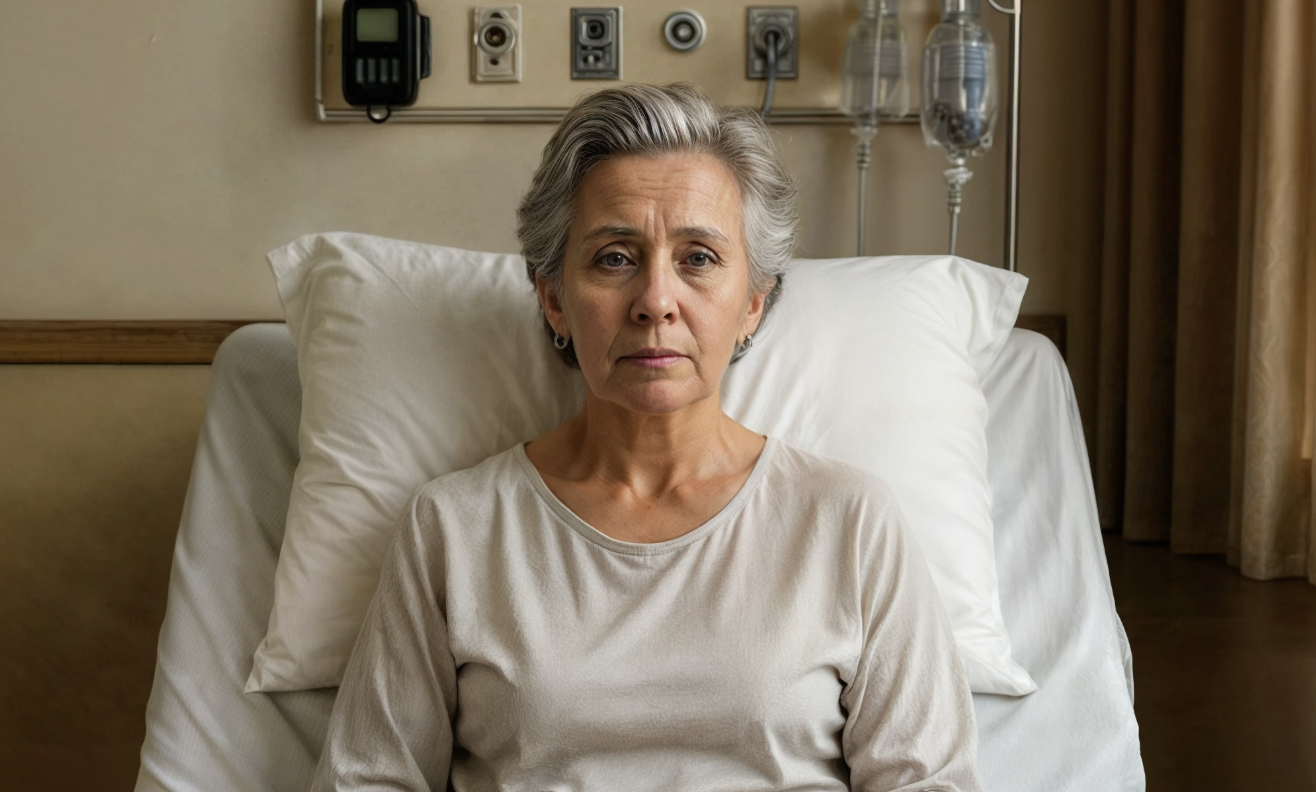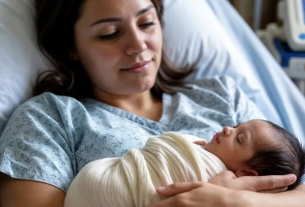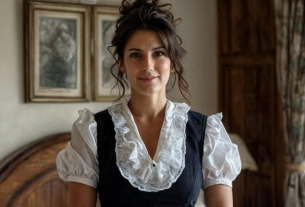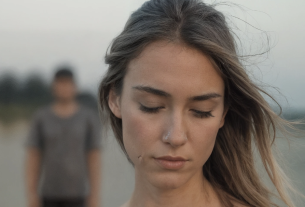Lyudmila was sitting in the kitchen by the window when it happened. She simply got up to fetch the salt to finish the soup—and suddenly her legs turned to cotton, чужие, not hers. She didn’t make it to the table—she sank to the floor, knocking over a jar of grains. Buckwheat scattered across the linoleum, and she kept trying to gather it with trembling hands, smearing angry tears over her cheeks.
Oleg found her only toward evening—he’d come home early from the factory, something had pinched in his chest, so he asked to leave. The soup on the stove had boiled away; the apartment was filled with the smell of burnt carrots. In the hallway—silence, and a yellow strip of light from the kitchen.
“Lyuda!” He froze in the doorway with a bag of bread. She was sitting, slumped against the radiator, mechanically picking through the spilled buckwheat.
They waited for the ambulance in silence. Lyudmila kept trying to explain about the soup: “You should eat something… There are cutlets in the fridge…” Oleg held her hand—thin, with prominent veins, with a wedding ring that now dangled on her finger.
The hospital smelled of bleach and burnt cabbage from the cafeteria. A young doctor with a fashionable beard flipped through the scans for a long time, frowning, sketching some diagrams on a form. He spoke at length, in a way that made little sense—and then suddenly said simply:
“Prepare yourselves. It’s going to be hard.”
Oleg nodded, wrote down the names of the medicines (eight thousand two hundred! and Lyuda’s pension was thirteen), while in front of his eyes stood that photo from the countryside—his wife in a red sarafan laughing, pressing an armful of daisies to her chest. Twenty years ago, at the “Rassvet” holiday camp.
In the ward, Lyudmila smiled diligently and pointed to the woman in the next bed:
“Meet her—this is Vera Stepanovna, she teaches math at a school.”
Vera Stepanovna, a thin woman with a yellowish face, nodded warmly. On her bedside table stood a photo of a boy about ten.
“My grandson,” she explained. “Knows nothing about math, but he plays the guitar.”
Oleg walked home on foot, though he could have taken the tram. The words kept spinning in his head: “It’s going to be hard.” Children were playing in the courtyard; it smelled of lilac and smoked fish from someone’s window.
“I need to call Pasha,” he thought about their son. And then he stopped in the middle of the yard, as if struck: he remembered how Lyuda had always dreamed of a little house in the village. “When we retire…”—and then talk of apple trees, garden beds, and how she’d treat the grandkids to homemade jam. And he used to wave it off—there’d be time, you’ll still have plenty of digging in those beds.
Oleg stood there, staring at the purple spring sky. He took out his phone—an old Nokia with a cracked screen.
“Pash? It’s Dad. Listen… here’s the thing…”
The next day he took time off at the factory and went to look for that magazine with house-sale listings. Lyudmila had been collecting it for three years, underlining all the options with a red pencil.
There was still time. There was supposed to be.
The realtor, Tamara Sergeyevna—a large woman in a knitted vest—talked and talked. About gas, about neighbors, about the mobile shop on Wednesdays. Oleg listened with half an ear, studying the gaps in the floorboards. The third house in a week—and still not it.
“You know,” Tamara Sergeyevna suddenly said, taking off her boots on the porch, “there’s one option. I don’t show it to everyone.”
She pulled a flowered notebook from her enormous bag and began leafing through it. “Malinovka. Twelve соток. A solid timber house. The owner died, the son’s in the city, he’s asking cheap.”
“Far?”
“Forty minutes by car. There’s a commuter train nearby. Most importantly—the place is good. Flat.”
“Flat”—Oleg latched onto that word. All these days he’d been thinking about how Lyuda would move around the yard in a wheelchair.
They reached Malinovka by lunchtime. The April sun already felt like summer; it smelled of last year’s grass and stove smoke. The house stood a little apart from the others—sturdy, with a high foundation. The little front garden was overgrown with rose hips, but the apple trees—old, spreading—looked well cared for.
“Sergey Ivanovich, the owner who died—you know what apples he used to pick here?” Tamara Sergeyevna rattled her key ring. “Antonovka, White Filling…”
Oleg stood on the porch, calculating: a ramp here, handrails there. The doors were wide—that was good. The windows were large and bright. Inside it smelled uninhabited—dust, old newspapers. But the floorboards were solid, the stove was good. And most importantly—space.
He walked the perimeter of the plot. The ground was flat, tamped down—you could lay paths. An old bathhouse in the corner of the yard—tear it down, put a greenhouse there. By the fence—bird cherry and an old lilac bush.
“Lyuda loves lilacs,” he thought. “She was always hauling bouquets home from the market.”
“I’ll take it,” he said, without even asking the price.
That evening he called his son. Pavel exploded at first: “What house? Have you lost your mind? Where are we going to get the money?” Then he went quiet, listening about Mom’s dream, about the apple trees, about how she’d collected magazines with pictures of gardens.
“Alright,” he finally said. “I’ll organize the guys. But don’t tell Mom a word yet.”
In the hospital Lyudmila was fading before Oleg’s eyes. She kept trying to do something—knitting socks for her neighbor, chatting with the orderlies. But Oleg saw how her hands trembled, how more and more often she fell silent mid-sentence, staring out the window.
And he was in a hurry. Spring—this was the time to make it. His son brought contractor friends; they worked on weekends. Vitya the welder—a buddy from the factory—welded handrails. Their daughter and her husband chose wallpaper—light-colored, with tiny flowers.
“Dad, should we put a dresser here?” the daughter traced a finger over the plan. “Mom likes everything in its place.”
Oleg only nodded. He hardly spoke anymore—saving his words for Lyuda. At the hospital he told stories from the factory, cracked jokes about the shop foreman. And she watched him closely, as if searching for something in his face.
“Olyozh,” she said once. “You’ve changed.”
“How so?”
“I don’t know. You’re glowing, like when you were young.”
He joked it off, but inside everything sang: “Just wait, my dear. You’ll see…”
Work at the house was in full swing. Ramps, handrails, special plumbing. The son kept whining—expensive—but Oleg just waved him off. What did money matter if Lyuda would smile?
They laid paths across the plot—wide, paved—so the wheelchair wouldn’t get stuck. By the porch they put a bench—to sit in the evening and watch the sunset.
Their daughter brought apple saplings—small, fragile. They chose low-growing varieties so Lyuda could reach from the wheelchair. Oleg dug the holes himself, prepared the soil. He kept remembering how Lyuda used to choose apples at the market—turning each one in her hands, smelling it.
The neighbors turned out to be good people. Grandpa Mikhalych the beekeeper kept pressing a jar of honey on him—“Take it, bring it to your wife.” His wife brought tomato seedlings—“Mine grow so sweet!”
But time kept slipping away—like water through fingers. There was so much to do…
On the day of discharge, Lyudmila sat on the hospital bed, fiddling with the edge of the washed-out institutional sheet. In three months the ward had become almost home—even the crack in the ceiling shaped like a bird no longer irritated her. That morning, Nurse Natasha helped pack her things—modest belongings in an old bag, dried herbs from her wardmate, an unfinished sock. Now all that was left was to wait.
“I have to say it today,” Lyudmila thought. “Enough torturing the man.”
She’d been choosing the words for a long time, at night when she couldn’t sleep. The main thing was that he understand she wasn’t holding him back. That she was grateful for everything, but… forty years was no joke, and now she was a burden around his neck.
Oleg arrived not alone—with their son. Pasha was oddly fidgety, eyes shining, glancing at his father. And Oleg—wearing a new shirt (when had he bought it?), clean-shaven, as if he’d grown younger.
“Well then, Mom,” Oleg leaned down to kiss her. “Let’s go?”
“Wait,” she gripped his hand. A lump rose in her throat, but she had to—she had to say it. “Sit down. We need to talk.”
“We’ll talk later,” he smiled in a strange, unfamiliar way. “Right now there’s something important.”
“No,” she drew in air like before a jump. “Oleg… I want a divorce.”
The ward went quiet—only sparrows chirping outside the window. Pasha froze with the bag in his hands.
“What have you come up with?” Oleg sat on the edge of the bed.
“I understand everything,” the words she’d rehearsed at night poured out, hot and rushed. “You’re exhausted because of me. I’ve become a burden. You deserve another life. A normal one…”
“Mom,” her son started toward her, but his father stopped him with a motion of his hand.
“Finish,” Oleg said quietly.
“I can see something’s going on,” she sobbed. “You only come home to sleep. You’re always rushing somewhere, you’re glowing… You must have met someone. And it’s right…”
Oleg was silent. Then he stood, paced the ward, and stopped by the window.
“Alright then,” he said without turning around. “Get up. We’re going.”
“Where?” she blinked, confused.
“You’ll see.”
Their son rolled up the wheelchair and helped her transfer. The corridor smelled of bleach and cafeteria porridge. Zina the orderly waved goodbye.
A car waited outside the hospital. Oleg sat beside her and took her hand—like when they were young, when they’d just met.
“Lyud,” he said softly. “Just don’t cry, okay?”
She nodded, crumpling the handkerchief she’d prepared in her pocket. The car pulled away, turned onto the ring road.
“This isn’t our way,” Lyudmila frowned.
“I know.”
Outside the window, garden plots flashed by, then fields, then houses again. An unfamiliar village—clean, well kept. Front gardens full of daffodils, laundry drying on lines.
Pasha turned toward a blue fence. The gate squeaked welcomingly.
“Like in a movie,” Lyudmila thought. And then she saw their daughter—standing on the porch, dressed up, holding a bouquet of the first tulips. Beside her their grandson shifted from foot to foot with some homemade painting in his hands.
“What is this?” Lyudmila looked around at her husband, bewildered.
“A new house,” Oleg stroked her shoulder. “Ours. Yours and mine. You wanted it…”
“What house?”
“Come on, I’ll show you.”
The wheelchair rolled easily up the gentle ramp. Inside the house smelled of fresh wood and пироги—home-baked pies. Sunlight lay on the clean floor, played in the curtains.
“Here’s the kitchen—everything’s low, so it’s convenient for you. Bedroom’s there, and the bathroom is specially fitted…”
Lyudmila said nothing, only turned her head, taking in the handrails along the walls, the wide doorways, the comfortable furniture.
“And now the main thing,” Oleg said, opening the back door.
A garden. Small, but all tidy. Young apple trees had already put out their first leaves. Along the even paved paths, beds were turning green. In the corner stood a greenhouse with seedlings.
“Olyozhek…” She covered her face with her hands. “So that’s where you’ve been disappearing…”
“Yes. The guys and I tried. Vitya did the wiring, Pasha and his friends… Everything for you, my dear.”
Lyudmila wept, smearing tears across her cheeks. And he knelt in front of her wheelchair and kissed her hands—thin, with prominent veins, with the wedding ring that now dangled on her finger…
In an old notebook Lyudmila found among the boxes of seedlings, the first entry was dated last May: “We moved. Oleg arranged everything like in a movie. And I, fool that I am, thought he’d stopped loving me…”
“June. First tomato from the greenhouse. Oleg keeps teasing me—it’s still green, but I’ve been guarding it on the windowsill for a week.”
“August. Our grandson found a hedgehog in the raspberry patch. Now every evening he brings it milk, thinking no one sees.”
“October. We sealed the last jar of apple compote. The Antonovka didn’t do well, but the White Filling turned out wonderfully. Oleg says next year we’ll plant three more saplings.”
Outside, the April sun played in the wet branches of the apple trees. The buds had swollen, ready to burst. Oleg had been busy for the second week with a new greenhouse—ordered some special one with vents. Says it’s for early cucumbers.
Lyudmila set the notebook aside and rolled her wheelchair up to the table. On the old flowered oilcloth stood a cup of half-finished tea. Their new neighbor, Grandpa Mikhalych, had brought fresh honey that morning: “First extraction—try it.”
Life flowed differently here. Unhurriedly—like that very honey from the old man’s apiary. You wake up in the morning—birds outside, daffodils yellowing in the front garden. At noon the sun looks straight into the kitchen—you can sit and squint like an old cat. In the evening Oleg heats the bathhouse—on Saturdays it’s their tradition now.
“Lyud!” her husband called from outside the window. “Look what I brought!”
In his hands a small gray bundle squirmed—a baby rabbit.
“Mikhalych gave it to me. Says he raised it specially for you. Want to fuss with it?”
She smiled. “Bring it in, you disaster.”
Forty years together, and he was still the same—now he’d bring home a rabbit, now some unheard-of seedlings. Over there in the greenhouse corner grow giant tomatoes—ordered seeds from somewhere in Siberia.
By lunchtime their daughter arrived with the grandkids. The youngest ran straight to the beds—he’d started his own little garden here, planted radishes. The older one helped Grandpa with the greenhouse, measuring and writing things down.
“Mom,” the daughter sat down beside her. “Maybe call a doctor? You look pale.”
“No need,” Lyudmila stroked her hand. “I’m just lost in thought.”
The illness hadn’t gone anywhere. Her legs still went numb in the mornings; she still swallowed handfuls of pills. But here, in this house where every little thing had been designed for her, the pain eased.
That evening, after everyone left, she and Oleg sat on the veranda. It smelled of blooming lilacs and freshly turned earth.
“You know,” she said suddenly, “back in the hospital I made it all up. The divorce, the other life…”
“I know,” he took her hand. “You’ve always thought too much.”
“It just didn’t seem possible—like this—everything for me.”
“And for whom else?”
She fell silent, studying his gray temple. Forty years ago, when they met by the factory gate, he was a dark-haired boy in a canvas jacket. And now—white at the temples, laugh-lines by his eyes. But his smile was the same—as if the sun had come out.
In the front garden a young starling fussed—working on a nest in the birdhouse they’d built with their grandson last week. On the windowsill the baby rabbit dozed in a box. Beyond the fence came neighbors’ voices—someone was drinking tea on a veranda.
Lyudmila opened her notebook and wrote: “April. The apple trees are about to bloom. Oleg promises there will be lots of apples. And also—we got a baby rabbit…”
“What are you writing?” her husband peered over her shoulder.
“Our life.”
He kissed the top of her head and went to check the greenhouse—there was always work to do around the house. And she sat there, watching him go, thinking what happiness it was when someone simply loved you. Without any reasons. Just because you exist.
Somewhere in the raspberry patch last year’s hedgehog rustled. It smelled of thawed earth and a coming storm. Life went on—unhurried, warm, real.
Lyudmila closed the notebook. Tomorrow would be a new day. And it would definitely be a happy one.
Because happiness is in the little things. In morning tea on the veranda. In apple buds. In the wrinkles at the corners of a loved one’s eyes. In the way a spring evening smells.
And in the way your heart beats when you realize—you’re home. Truly home.



